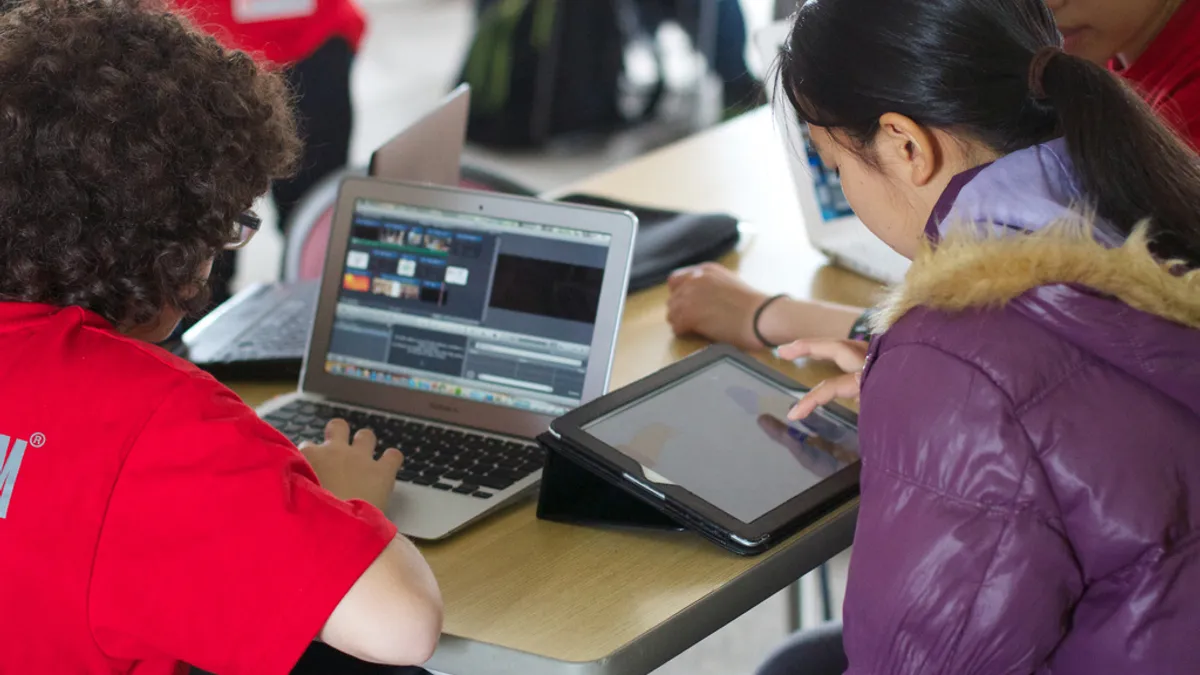Over the last few years, technology has reshaped the classroom in many ways — and is continuing to do so. From digital textbooks and platforms that make teaching often-complex STEM subjects simpler to deep data analytics that measure and predict student achievement, ed tech is addressing a number of issues in the nation's schools.
Even so, there's such a large amount of tools and platforms out there now that it can be difficult to see some of the most promising developments in the space. To make it easier, we've selected eight of our favorites that districts and schools should have on their radars.
Books That Grow
Developed by Borne Digital, Books That Grow is a digital reading platform that becomes more challenging as students progress and improve. Among the types of books offered are literary classics, fairy tales, and folklore, as well as non-fiction science and social studies.
The platform was funded by a successful Kickstarter campaign last year that raised $20,559. In December, Books That Grow was among three winners in the education category of Verizon's 2014 Powerful Answers Awards. A final selection for the top prize of $1 million was set for Jan. 27 but postponed due to Winter Storm Juno, but is expected to be announced later this week. The runners up will receive $250,000 each.
Alma
LMS and SIS solution Alma launched just around a year ago, but its growth in that time has been impressive. As of August, the Oregon-based startup had schools in 22 states using its product, which features a grade book, report cards, student records, and curriculum management and data analytics tools all in one place, and with all core features free. For $2 a student, schools can also utilize custom-made report cards based on traditional or proficiency-based grading methods and incorporating the school's colors.
By August, the company had already expanded to the East Coast, opening a second office in the Washington, DC, area, overseen by the company's new president, Jack Macleod. With that kind of growth during year one, it should be interesting to see how 2015 pans out for Alma.
Classroom Inc
This nonprofit uses gamification and blended learning to engage students in grades 6 through 12 who are struggling. Classroom Inc's content is heavily focused on Common Core literacy and math, and the Bill & Melinda Gates Foundation is among its backers. Current games include After The Storm, a middle school literacy learning game consisting of five units with optional project-based activities, and The Sports Network 2, which can serve as Reading Informational Text practice or as an eighth grade assessment.
With gamification becoming increasingly popular, companies like Classroom Inc will be particularly interesting to watch — especially those that base their products largely on Common Core standards. Perhaps this year will see the launch of a larger math game, beyond what might already exist in its series of classic simulations.
Vocareum
Vocareum is a computer science-specific learning management system that can be used in high school advanced placement classes, college and university courses, or MOOCs. Through Vocareum, teachers can review and comment on a student's coding using an in-browser workbench, and students' work is showcased in a portfolio. The LMS is also cloud-based, requiring no installation.
The push for an increase in computer science education could give a company like Vocareum the opportunity to set itself up as a classroom necessity in 2015 and beyond.
CodeHS
Speaking of coding, CodeHS' mission is to make the process of teaching the practice to high schoolers easier. The company, which offers a free hour of coding instruction, pays computer science majors to tutor students around the globe, in addition to offering basic coding classes at a price of $3,000 a year for 50 students or $9,000 a year for 200 students. Alternatively, there are 5-month "semester" packages. Included in the price tag are access to video tutorials, a library of teacher resources, and auto-grading for certain activities. Of course, if a school or district wants to splurge on the $30,000 "Full" package for 50 students, it can gain access to individualized tutoring and grading for all students.
School Yourself
Another of Verizon's Powerful Answers Award finalists, School Yourself was founded in 2012 and the team behind it holds nine degrees from MIT and three from Harvard, and it has backing from the Harvard Innovation Lab, the Hertz Foundation, the Dell Social Innovation Lab, and edX. The gist of the online platform: It aims to take the boredom out of math by offering hundreds of interactive, personalized lessons that are constantly improved using a built-in analytics tool. Ideal uses include flipped learning, remedial learning, self learning, and homeschooling. Perhaps the best part, though, is that its lessons — which include geometry, algebra, trigonometry, pre-calculus, and calculus — are free.
Like coding, math is a high-demand subject that has been given a lot of focus in recent years. A tool like School Yourself could become a crucial tool for schools and districts looking to boost math achievement.
BrightBytes
BrightBytes, a student data analytics company, had a pretty big year in 2014. Aside from a $15 million funding round, the debut of a dropout prediction and prevention tool, and a user base topping 10,000 schools, its Clarity platform received a number of awards and accolades, including being ranked among District Administration's Top 100 Products and CIO Review's 20 Most Promising Education Tech Solution Providers.
Although student data privacy concerns will remain a factor for BrightBytes to keep in mind, it's safe to say the coming year looks pretty, well, bright.
Discovery Education Techbooks
Even if they don't get the same amount of attention as other ed tech tools, digital textbooks are arguably the biggest classroom innovation of the last decade. Perhaps their biggest benefit: They can be updated with new information quicker and more affordably than a district could replace its existing paper texts with newer editions. But there's more to putting out a stellar digital text than just creating a PDF version of an existing book.
Among the companies that really gets that is Discovery Education. Its line of Techbooks — the most recent of which, for math, debuted earlier this month — features interactive materials, standards-aligned assessments, and gamification while placing material in a real-world context that students can relate to. The Math Techbook, for example, also includes built-in tools like a graphing calculator and matrix solver. At a launch event for the Math Techbooks, Mooresville, NC, Superintendent Dr. Mark Edwards praised the success of those offered in science and social studies, as well. How this line continues to perform, and what might be next in the pipeline, will be interesting to watch.
Would you like to see more education news like this in your inbox on a daily basis? Subscribe to our Education Dive email newsletter! You may also want to read Education Dive's look at what 6 states are doing to recruit and retain good teachers.







 Dive Awards
Dive Awards














